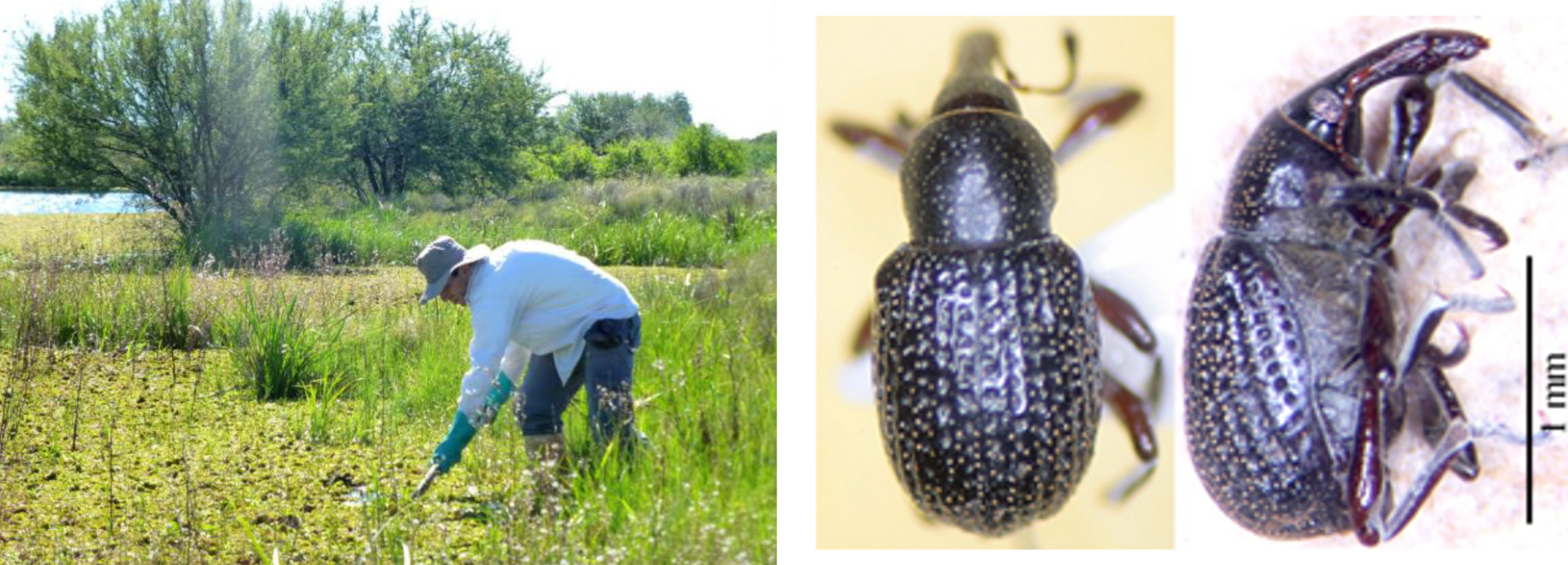A Weevil from Southern South America Can Improve Biocontrol of Giant Salvinia
By Fernando Mc Kay and Willie Cabrera Walsh
Giant salvinia (Salvinia molesta D. Mitch., Salviniaceae), is an aquatic fern native to South America that is invasive in southern USA. This invader affects recreational boating activities, industrial fishing, farming, and hunting, and also poses a threat to native biodiversity and ecosystem services. The aquatic weevil Cyrtobagous salviniae (Coleoptera: Curculionidae) is an effective natural enemy of giant salvinia.
However, the plant is invading more temperate areas with harsher winters in the north LA, TX and MS, where the weevil populations can’t overwinter. An agreement was signed between Louisiana State University (LSU) and Foundation for the Study of Invasive Species (FuEDEI) to cooperate on the search of cold-hardy ecotypes/strains of C. salviniae weevils in Argentina, to enhance biocontrol of giant salvinia in the cooler areas. Several samples have been shipped to LSU from Uruguay and Argentina, and although they showed better cold resistance, the weevils could not be mass reared.
This year, Dr. Rodrigo Díaz, research leader of the giant salvinia project and Research associate Dane Shackelford visited FuEDEI facilities to renew the cooperation efforts. Good numbers of weevils were hand-carried to attempt mass-rearing at LSU quarantine facilities. As the project progresses, the developments by LSU researchers will soon be shared with other US research institutions in Florida (USDA ARS Invasive Plant Research Laboratory), Texas (Aquatic Ecology and Invasive Species Branch, Environmental Laboratory, US Army Engineer Research and Development Center) and Mississippi (USDA ARS Biological Control of Pests Research Unit).
 Left: Collecting Salvinia samples in Argentina. Right: Adult Salvinia weevil
Left: Collecting Salvinia samples in Argentina. Right: Adult Salvinia weevil
For inquiries regarding this article contact: info@fuedei.org.
The Foundation for the Study of Invasive Species (FuEDEI), formerly known as the South American Biological Control Laboratory (SABCL), is located in Hurlingham, Argentina, near Buenos Aires. The SABCL/FuEDEI plays a crucial role collecting and providing candidate biological control agents for South American weeds and pest insects for federal and state cooperators, several U.S. universities, and research collaborators worldwide since 1962. FuEDEI’ s main mission includes exploring for natural enemies of target insects and weeds in Argentina and neighboring countries and conducting host-specificity testing to determine their safety for eventual release in the U.S. In addition, complementary research that investigates the ecology, behavior, taxonomy, and genetic differences based on geographic distribution is conducted on both targets and potential agents. Performing these studies in the region of origin of the target pest serves as an efficient prescreening process that reduces the number of biocontrol agent candidates shipped. This reduces the amount of quarantine work and valuable quarantine space occupation, the expenses related to permitting processes, the risks of escapes, and the release of maladapted or wrongly identified agents to a minimum, saving in costs and hazards. On some occasions these complementary studies help us understand why an exotic organism becomes invasive, which can, in turn, lead to determining novel strategies for their management.
